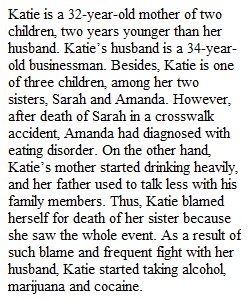


Q Instructions It is time to submit the first part of your final project. To complete this assignment, review the Final Project I Guidelines and Rubric PDF document. Hide Rubrics Rubric Name: HSE 352 Final Project I Rubric (SA) Print Rubric Criteria Exemplary Proficient Needs Improvement Not Evident Criterion Score Summary 15.83 points Meets “Proficient” criteria, and level of detail provided demonstrates a sophisticated understanding of the most pressing problem areas for the client 13.4555 points Provides a summary of the client’s case and the issues presented, including the most pressing problem areas for the client 8.7065 points Provides a summary of the client’s case and the issues presented, including the most pressing problem areas for the client, but summary is cursory or illogical or contains inaccuracies 0 points Does not provide a summary of the client’s case and the issues presented Score of Summary, / 15.83 Counseling Approach: Counseling Theories 15.83 points Meets “Proficient” criteria, and level of detail provided demonstrates a sophisticated understanding of counseling theories 13.4555 points Explains the counseling theories that would apply to this case and help counselor address different client needs 8.7065 points Explains the counseling theories that would apply to this case and help counselor address different client needs, but explanation is cursory or illogical or contains inaccuracies 0 points Does not explain the counseling theories that would apply to this case and help counselor address different client needs Score of Counseling Approach: Counseling Theories, / 15.83 Counseling Approach: Why Counseling Theories Apply 15.83 points Meets “Proficient” criteria and makes cogent connections between selected counseling theories and the client’s needs 13.4555 points Justifies why selected counseling theories apply, with support from specific examples and/or research 8.7065 points Justifies why selected counseling theories apply, but justification is illogical or not supported with specific examples and/or research 0 points Does not justify why selected counseling theories apply Score of Counseling Approach: Why Counseling Theories Apply, / 15.83 Counseling Approach: Interventions, Procedures, and Techniques 15.83 points Meets “Proficient” criteria and makes cogent connections between the client’s case and interventions, procedures, and techniques that would be used in working with this client 13.4555 points Explains the interventions, procedures, and techniques that would be used in working with this client 8.7065 points Explains the interventions, procedures, and techniques that would be used in working with this client, but explanation is cursory or illogical or contains inaccuracies 0 points Does not explain the interventions, procedures, and techniques that would be used in working with this client Score of Counseling Approach: Interventions, Procedures, and Techniques, / 15.83 Informed Approach 15.83 points Meets “Proficient” criteria and makes cogent connections between various counseling theories and this client’s case 13.4555 points Explains how the selected counseling theories have informed approach, including what about the client’s case called for the use of the chosen theories over others 8.7065 points Explains how the selected counseling theories have informed approach, including what about the client’s case called for the use of the chosen theories over others, but explanation is cursory or illogical or contains inaccuracies 0 points Does not explain how the selected counseling theories have informed approach Score of Informed Approach, / 15.83 Treatment Goals 15.83 points Meets “Proficient” criteria, and level of support provided demonstrates a sophisticated understanding of treatment goals supported by counseling theories 13.4555 points Develops appropriate treatment goals based on the counseling approach with support from counseling theories 8.7065 points Develops treatment goals based on the counseling approach, but goals are not comprehensive, inappropriate for the client, or not supported with counseling theories 0 points Does not develop treatment goals based on the counseling approach Score of Treatment Goals, / 15.83 Articulation of Response 5.02 points Submission is free of errors related to citations, grammar, spelling, syntax, and organization and is presented in a professional and easy-to-read format 4.267 points Submission has no major errors related to citations, grammar, spelling, syntax, or organization 2.761 points Submission has major errors related to citations, grammar, spelling, syntax, or organization that negatively impact readability and articulation of main ideas 0 points Submission has critical errors related to citations, grammar, spelling, syntax, or organization that prevent understanding of ideas Score of Articulation of Response, / 5.02 Total Score of HSE 352 Final Project I Rubric (SA), / 100
View Related Questions